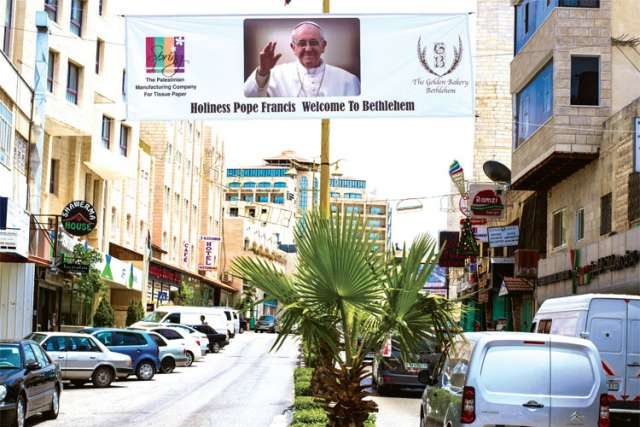Fr. Aziz Halaweh, parish priest at Christ the Redeemer Church in the Christian village of Taybeh, has written to the Pope about the inability of Palestinian clergy to enter Jerusalem. Official Vatican documents which should guarantee safe passage are routinely rejected by Israeli soldiers at checkpoints, Halaweh said.
“I’ve tried many times to go with my car,” Halaweh told The Catholic Register. “They don’t allow me. I showed them my Vatican lésé passé (travel document). The soldier told me literally, word- by-word, ‘Throw it away, this is useless.’ ”
While permission is usually granted when the Latin Patriarchate makes a special request, that process is cumbersome, said Jesuit Father David Neuhaus, the patriarchal vicar with responsibility for Hebrew-speaking Catholics in Israel and pastoral care of migrants.
“Freedom of travel and restricted access to Jerusalem are certainly a challenge to the functioning of a Church that has institutions, parishes, schools, hospitals, clinics, homes for the elderly and handicapped, orphanages, etc. in all sectors of the Holy Land — Israel, Palestine (both West Bank and Gaza Strip), Jordan and Cyprus,” Neuhaus said in an e-mail.
The Pope lands in Amman, Jordan, on May 24, where he will meet with Syrian war refugees. He is in Bethlehem May 25 for talks with Palestinian Authority President Mahmoud Abbas, to say Mass in Bethlehem Square and to hold a private meeting with Ecumenical Patriarch Bartholomew of Constantinople. The pilgrimage ends in Jerusalem on May 26 where the Pope meets with Jewish religious leaders and with Israel’s president and prime minister.
Freedom of movement for Palestinians is just one example of how the politics of the Pope’s three-day visit to the Holy Land are already raging.
The signs and banners around Bethlehem’s Manger Square have been strategically placed and worded for maximum political advantage. Pope Francis will celebrate Mass surrounded by political slogans.
He is being greeted in Bethlehem by the Palestinian Authority president as one head of state greeting another. The Palestinian Authority, in charge of organizing the security and logistics for the Pope’s Bethlehem visit, has ensured television cameras cannot miss signs that read “Welcome Pope Francis to the State of Palestine.”
In coffee shops and at taxi stands, Palestinians believe the Pope’s visit is another chance to make a case for proper statehood. Palestinian organizers have installed a temporary stage at one end of Manger Square for TV cameras to show the papal Mass on May 25. Stage left is a giant banner which declares “Return is our right and our will.”
Israel, intent on maintaining a Jewish majority in the country, insists it cannot grant Palestinian refugees the right to return and repossess property they lost during the 1948 war. Palestinians counter that returning to their homeland is a right granted to all refugees everywhere else in the world, defended by international law.
But there’s more politics than just the status of the two-state solution. In Lebanon, Cardinal Bechara Rai has caused a furor by inviting himself to the Pope’s visit to Jerusalem. Vatican officials make it clear it is the cardinal’s initiative. What could be controversial about the Patriarch of the Maronite Catholic Church making a Holy Land pilgrimage with the Pope? Hezbollah, which holds the balance of power in Lebanon, calls Rai’s decision an “historic sin” because by implication it recognizes the State of Israel. Lebanon has been at war with Israel since 1948.
It’s not just Arabs who will feel political discomfort. Pope Francis intends to visit Deheishe refugee camp in Bethlehem, home to 13,000 refugees. That visit will displease Israel, which would prefer international visitors not speak of the camp, let alone visit it with the world’s media in tow.
For Halaweh, the issues revolve around showing respect and dignity for the people who have lived in the region since the time of Christ. And it begins with granting Christians freedom of movement in the Holy Land. Unless Israel is willing to make concessions, the state of constant conflict will remain, he said.
“They (Israelis) think Jerusalem is for them. It is not for them. It is for every Christian, for every Jew, for every Muslim. It should be open,” Halaweh said.


